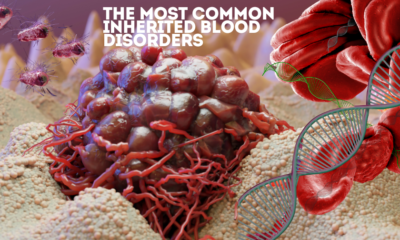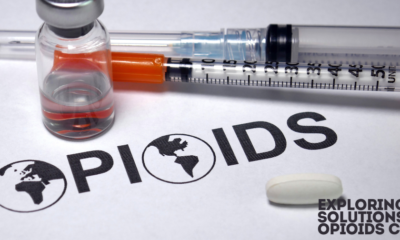Healthcare
Global Health Security: Preparing for the Next Pandemic

The world has learned hard lessons from the COVID-19 pandemic, which exposed gaps in global health security and preparedness. As countries continue to recover from their economic, social, and health impacts, the focus has shifted to preventing and mitigating the effects of future pandemics. Preparing for the next global health crisis involves improving global governance, enhancing research and development (R&D), investing in health infrastructure, and building international partnerships.
The Importance of Global Health Governance
The COVID-19 pandemic highlighted the critical need for more robust global health governance. The Council on Foreign Relations (CFR) has underscored that improving global governance structures is essential for effective pandemic preparedness. The CFR report “Negotiating Global Health Security: Priorities for U.S. and Global Governance of Disease” emphasizes that global health security is at a critical juncture, where coordinated global responses, robust implementation frameworks, and an effective governance structure are necessary to mitigate future pandemics. The report argues that three crucial tasks are paramount: promoting public health capabilities, bridging gaps in global health governance, and mitigating the harmful effects of geopolitical tensions.
A significant component of this governance strategy involves the standardization of response mechanisms across countries. The World Health Organization (WHO) and the United States’ Global Health Security Agenda (GHSA) utilize the Joint External Evaluation (JEE) framework to review countries’ readiness for pandemics. This framework assesses core biosecurity, immunization, surveillance, and emergency management capabilities. However, challenges such as financing, misinformation, and climate change impacts on health require continuous U.S. leadership and global collaboration.
Enhancing Research and Development
The need for a broader research strategy is another critical aspect of preparing for future pandemics. The WHO and the Coalition for Epidemic Preparedness Innovations (CEPI) have called for a more expansive research agenda that focuses on entire families of pathogens rather than individual viruses. This approach aims to create tools and countermeasures that can be rapidly adapted to emerging threats, improving the speed of response and effectiveness of interventions. At the Global Pandemic Preparedness Summit 2024, it was stressed that comprehensive research on pathogens, transmission, and immune responses is vital for preparing for future outbreaks.
Moreover, institutions like the WHO and CEPI encourage countries to invest in prototype pathogens as “guides” for developing vaccines, diagnostics, and therapeutics. This proactive research framework will help create a knowledge base applicable to various potential pandemics, enhancing global readiness.
Strengthening Health Infrastructure and Capacity Building
Strengthening global health infrastructure is another critical area in preparing for the next pandemic. Investments in public health infrastructure, especially in low- and middle-income countries, are vital to closing gaps in global health security. The U.S. Global Health Security Strategy, aligned with the WHO’s JEE framework, aims to build competency in 50 partner countries across five core health security capabilities by 2028. These investments are necessary to protect public health and ensure economic stability by mitigating the impact of global health crises on trade and travel.
Additionally, there is a call for a multi-sectoral approach to pandemic preparedness. The Centre for Strategic and International Studies (CSIS) notes that new institutional developments like the creation of the Office of Pandemic Preparedness and Response and the latest Bureau of Global Health Security and Diplomacy at the U.S. State Department are critical in enhancing capabilities. However, continuous investment and bipartisan support are needed to maintain and strengthen these initiatives.
Promoting International Collaboration and Partnerships
The COVID-19 pandemic demonstrated that no country can tackle global health threats alone. International partnerships are essential for effective pandemic preparedness and response. Collaboration with governments, non-governmental organizations, and multilateral institutions facilitates information sharing, joint research, data sharing, and coordinated response efforts during emergencies.
The WHO’s R&D Blueprint for Epidemics also advocates for enhanced international collaboration to ensure a rapid and coordinated response to future pandemics. This includes shared surveillance systems, transparent data sharing, and harmonized regulatory processes for faster diagnostics, vaccines, and treatment deployment.[
Addressing Climate Change and Emerging Threats
Climate change is increasingly recognized as a significant driver of pandemic risk. The CFR report highlights that climate change contributes to the likelihood of zoonotic spillovers when diseases jump from animals to humans by altering habitats and increasing human-wildlife interactions. Furthermore, the global supply chain vulnerabilities exposed during the COVID-19 pandemic underscore the need for resilient systems to ensure the availability and distribution of medical supplies.
Researchers are also looking at innovative solutions to predict and prevent the next pandemic. Nature magazine discusses the use of algorithms and artificial intelligence to predict pandemic hotspots and potential zoonotic spillovers, thus enabling more targeted surveillance and early interventions.
-
Government and Multilateral Funding Initiatives
Governments around the world have increased their focus on funding health security, recognizing the economic and social impact of pandemics. Some key initiatives include:
United States: The U.S. government, through its Global Health Security Strategy, has committed significant funding to improve health security in low- and middle-income countries. This includes investments in building core capabilities such as disease surveillance, laboratory systems, emergency management, and workforce development. The U.S. has also established a new Office of Pandemic Preparedness and Response and the Bureau of Global Health Security and Diplomacy at the State Department to ensure coordinated responses and funding for global health security efforts (CSIS).
European Union: The EU has increased its funding for health security through various mechanisms, including the Horizon Europe research program, which allocates funds for pandemic preparedness and response. The EU also established the Health Emergency Preparedness and Response Authority (HERA) to fund research and development of medical countermeasures and coordinate EU-wide health security efforts(CSIS).
World Health Organization (WHO): The WHO plays a central role in coordinating international funding for health security. It oversees the Contingency Fund for Emergencies (CFE), which provides rapid financing to respond to disease outbreaks and humanitarian emergencies. WHO also launched the Access to COVID-19 Tools (ACT) Accelerator during the pandemic to pool resources for diagnostics, therapeutics, and vaccines for low- and middle-income countries(World Health Organization (WHO).
Coalition for Epidemic Preparedness Innovations (CEPI): CEPI, a public-private partnership launched in 2017, is focused on accelerating the development of vaccines against emerging infectious diseases. It has raised significant funding from governments, philanthropic organizations, and private sector entities to invest in vaccine research and preparedness initiatives for diseases with pandemic potential (World Health Organization (WHO).
-
Private Sector and Philanthropic Funding
Private sector entities and philanthropic organizations have increasingly recognized the importance of investing in global health security. These contributions are vital for bridging gaps that government and multilateral funding may not cover.
The Bill & Melinda Gates Foundation: One of the most prominent private funders in global health, the Gates Foundation has committed billions of dollars to support vaccine development, strengthen health systems, and improve disease surveillance and diagnostics capabilities worldwide. The foundation also contributed to the ACT Accelerator initiative during the COVID-19 pandemic (World Health Organization (WHO).
Global Health Innovative Technology (GHIT) Fund: The GHIT Fund, a partnership between the Japanese government, private companies, and international organizations, focuses on funding research and development for neglected diseases and pandemic preparedness. It provides grants for developing diagnostics, treatments, and vaccines for diseases with high pandemic potential World Health Organization (WHO).
-
Innovative Financing Mechanisms
Innovative financing models are being explored to address the shortfall in health security funding and to ensure a rapid response to health emergencies:
Pandemic Emergency Financing Facility (PEF): Launched by the World Bank, the PEF was designed to provide financial resources quickly to developing countries during a severe infectious disease outbreak. It combines insurance and cash components to ensure swift disbursement of funds. However, the PEF faced criticism for delays and limitations in responding to the COVID-19 pandemic, leading to calls for reform or alternative funding mechanisms(CSIS).
Global Health Security Agenda (GHSA) Financing Facility: This facility aims to mobilize resources from a broad range of donors, including governments, foundations, and the private sector, to support countries in building health security capacities. It focuses on funding efforts that align with the Joint External Evaluation (JEE) tool to assess and address gaps in countries’ preparedness for pandemics(CSIS).

-
Challenges and Recommendations for Health Security Funding
Despite the increased focus on health security funding, several challenges persist:
Fragmented Funding Landscape: The lack of coordination among various funding sources, national governments, international organizations, and private donors can lead to overlapping efforts and inefficient use of resources.
Sustainability and Predictability: Funding for health security often spikes in response to a crisis, such as COVID-19, but may decline when the immediate threat diminishes. This “panic and neglect” cycle hampers long-term capacity building and preparedness.
Need for a Global Financing Framework: Experts argue for establishing a global financing framework for pandemic preparedness that ensures predictable, sustainable, and equitable funding. This framework should involve public-private partnerships, multi-year commitments, and mechanisms to hold countries accountable for their commitments to global health security (Council on Foreign Relations Nature).
Future Outlook and Recommendations
The pathway to preventing the next pandemic involves a comprehensive, multi-dimensional approach. Critical recommendations for global health security include:
1) Strengthening Global Governance: Countries must commit to strengthening WHO’s role, ensuring compliance with the International Health Regulations (IHR), and building robust health security infrastructures that are accountable and transparent.
2) Investing in R&D: Governments and international organizations need to support R&D for a broader range of pathogens, adopt a “prototype pathogen” approach, and ensure that vaccines, treatments, and diagnostics can be quickly adapted to new threats.
3) Building Resilient Health Systems: Low- and middle-income countries must receive adequate funding and support to build robust and resilient health systems capable of detecting, responding to, and mitigating pandemics.
4) Enhancing International Collaboration: There is a need for greater coordination among countries and international agencies to share data, best practices, and resources. A unified, global strategy is necessary to tackle misinformation, geopolitical tensions, and economic challenges associated with pandemics.
5) Addressing Climate Change: Recognizing and addressing the link between climate change and emerging infectious diseases is crucial. Efforts should focus on both mitigation of climate impacts and adaptation strategies to prevent disease outbreaks.
The challenge of global health security is daunting, but with coordinated efforts, innovative research, and strong international collaboration, the world can be better prepared to face the next pandemic.
-

 Press Release6 days ago
Press Release6 days agoBellarium ($BEL) Price Prediction: Could It Hit $5 by 2026?
-

 Press Release3 days ago
Press Release3 days agoClinical Trials Market Set for Robust Growth, Driven by Drug Development Surge and Digital Innovation
-

 Business5 days ago
Business5 days agoHow Managed IT Solutions Help Small Teams Compete at Enterprise Scale
-

 Press Release4 days ago
Press Release4 days agoFill-Finish Pharmaceutical Contract Manufacturing Market Expected to Flourish Amid Biopharmaceutical Boom and Global Outsourcing Trend by 2035
-

 Press Release4 days ago
Press Release4 days agoIndustrial Boiler Market Expected to Surpass USD 24.4 Billion by 2035 Amid Growing Demand for Energy Efficiency and Industrialization
-

 Press Release4 days ago
Press Release4 days agoPreventive Vaccines Market to Witness Strong Growth by 2035
-

 Press Release4 days ago
Press Release4 days agoGreen Bio Chemicals Market Poised for Sustainable Growth amidst Global Shift to Eco-Friendly Alternatives by 2035
-

 Press Release4 days ago
Press Release4 days agoPet Food Nutraceutical Market Set for Robust Expansion Amid Rising Demand for Pet Wellness by 2035






























